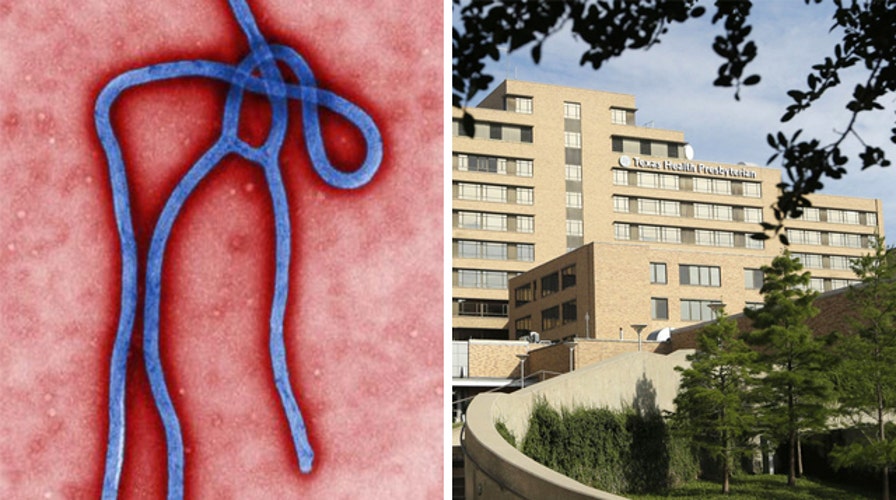First case of Ebola in US diagnosed at Dallas hospital
Hospital says patient contracted virus in Liberia
Authorities said five students who had contact with a man diagnosed with Ebola in Dallas are being monitored but are showing no symptoms of the disease.
Dallas Independent School District Superintendent Mike Miles said Wednesday that the students were in school this week after possibly being in contact with the male patient, identified as Thomas Eric Duncan, over the weekend.
Miles said the students are showing no symptoms and are now being monitored at home. Health officials said the disease is only spread by people with symptoms, such as diarrhea or vomiting.
As an added precaution, Miles said additional health and custodial staff will be at the five schools the students attend.
Duncan has been in isolation at Texas Health Presbyterian Hospital in Dallas since Sunday, after initially being sent home with antibiotics Friday.
Blood tests by Texas health officials and the Centers for Disease Control and Prevention (CDC) separately confirmed his Ebola diagnosis Tuesday.
Duncan is the first person to be diagnosed with Ebola in the U.S. and was listed in serious condition Wednesday.
Authorities said the ambulance crew who transported Duncan and members of his family are also among the 12 to 18 people being monitored after possible exposure. The CDC sent a nine-member team to Dallas Wednesday to work with local and state health agencies to ensure those people are watched every day for 21 days.
"If anyone develops fever, we'll immediately isolate them to stop the chain of transmission," CDC director Dr. Tom Freiden said.
Mai Wureh, Duncan's sister, said her brother went to a Dallas emergency room on Friday after initially developing symptoms Wednesday and was sent home with antibiotics. Wureh says hospital officials asked for his Social Security number and he said that he didn't have one because he was visiting from Liberia.
Dr. Mark Lester confirmed Wednesday that a nurse asked Duncan on his first visit whether he had been in an area affected by the Ebola outbreak that has killed thousands in West Africa but that the "information was not fully communicated throughout the whole team."
Hospital officials told the Dallas Morning News that they are reviewing the initial decision to send him home.
Officials said Duncan lived and worked in Liberia, where he likely caught the disease from one of the thousands infected in that country, but showed no symptoms when he flew back to the U.S. Sept. 19. As a result, no one who traveled with him on that flight is at risk of Ebola.
United Airlines confirmed in a statement Wednesday that a man stricken with Ebola flew from Brussels to Washington's Dulles International Airport on Flight 951, with a connection to Dallas/Fort Worth International Airport on Flight 822, and cited the CDC in saying the patient "could not have been contagious on the dates he traveled." The airline, however, said it could not name the passenger without his consent.
Meanwhile, members of North Texas's 10,000-strong Liberian community told the Associated Press they were skeptical of the Centers for Disease Control and Prevention Director Tom Frieden's assurances that "we'll stop this in its tracks in the U.S."
"We've been telling people to try to stay away from social gatherings," Stanley Gaye, president of the Liberian Community Association of Dallas-Fort Worth, said at a community meeting Tuesday.
"We need to know who it is so that they (family members) can all go get tested," Gaye told The Associated Press. "If they are aware, they should let us know."
The association's vice president encouraged all who may have come in contact with the virus to visit a doctor and she warned against alarm in the community.
"We don't want to get a panic going," said Roseline Sayon. "We embrace those people who are coming forward. Don't let the stigma keep you from getting tested."
Four American aid workers who became infected in West Africa have been flown back to the U.S. for treatment after they became sick. They were treated in special isolation facilities at hospitals in Atlanta and Nebraska. Three have recovered.
A U.S. doctor exposed to the virus in Sierra Leone is under observation in a similar facility at the National Institutes of Health.
Liberia is one of the three hardest-hit countries in the epidemic, along with Sierra Leone and Guinea.
Ebola is believed to have sickened more than 6,500 people in West Africa, and more than 3,000 deaths have been linked to the disease, according to the World Health Organization. But even those tolls are probably underestimates, partially because there are not enough labs to test people for Ebola.
Two mobile Ebola labs staffed by American naval researchers arrived this weekend and will be operational this week, according to the U.S. Embassy in Monrovia. The labs will reduce the amount of time it takes to learn if a patient has Ebola from several days to a few hours.
The U.S. military also delivered equipment to build a 25-bed clinic that will be staffed by American health workers and will treat doctors and nurses who have become infected. The U.S. is planning to build 17 other clinics in Liberia and will help train more health workers to staff them.
Click for more from the Dallas Morning News.
The Associated Press contributed to this report.

